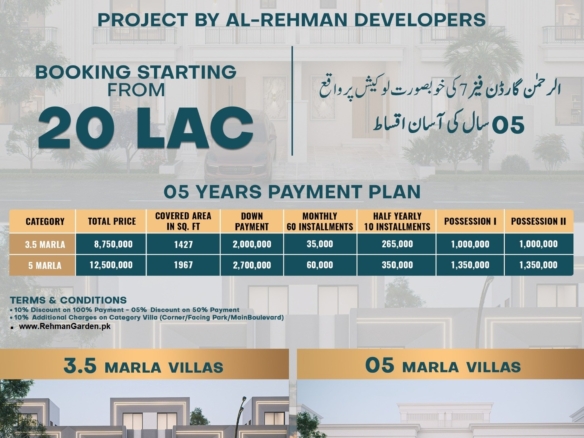Property tax refers to the mandatory financial contribution property owners make to the FBR & government of Pakistan, earmarked for national development and prosperity. These funds are allocated towards diverse initiatives, including infrastructure projects, attracting multinational corporations, import activities, and salary disbursements.
The scope of property taxation extends beyond residential dwellings to encompass all tangible assets registered under an individual’s name. This encompasses residential and commercial properties, vacant plots, housing societies, as well as industrial and agricultural land holdings.
Given Pakistan’s fluctuating economic landscape, few career avenues offer as promising returns as real estate investment. Investors can capitalize on commercial hubs in cities like Islamabad and Peshawar, generating both short-term and long-term revenue streams. However, adherence to taxation regulations is paramount to ensure transparency and optimize Return on Investment (ROI).
Exploring Taxation in Pakistan:
Tax Year Definition: In Pakistan, the tax year spans twelve months, running from 1st July to 30th June, aligning with the fiscal calendar. For instance, the forthcoming property tax year in Pakistan extends from 1st July 2024 to 30th June 2025.
Types of Property Taxes in Pakistan:
Property taxes in Pakistan encompass four distinct categories:
Capital Gain Tax (CGT): A levy imposed on profits realized from asset, land, or stock transactions, with rates commencing at 5%. Capital Value Tax (CVT): A fixed tax calculated based on property valuation set by District Collector (DC) offices, subject to variation.
Withholding Tax: An advance tax applicable to real estate transactions, with rates revised periodically. Stamp Duty: A nominal fee levied on property transaction documents, typically amounting to 5% of the property value.
Let’s delve deeper into these tax categories:
Capital Gain Tax (CGT): CGT pertains to the tax levied on profits derived from asset sales. This tax applies exclusively to realized gains from taxable assets such as real estate, stocks, and bonds.
Notably, unsold assets remain exempt from CGT, regardless of holding duration or appreciation in value. CGT rates in Pakistan vary, with percentages escalating based on profit thresholds, particularly affecting commercial property transactions.
Key Features of CGT: The salient features of CGT include:
Tax liability incurred upon asset sale. Taxation limited to profitable capital assets. Losses offsettable against gains to reduce tax burden. It’s pertinent to note that the 4% Pakistan super tax, applicable in the fiscal year 2024, has been extended.
Capital Value Tax (CVT): CVT constitutes a predetermined tax amount established by revenue authorities, implemented by DC offices nationwide. These rates typically lag behind prevailing market valuations.
Imposed upon property sales, CVT obligates investors to remit taxes based on land prices rather than market rates. Although some attempt to minimize tax liabilities through undervaluation, government digitization initiatives enhance transparency, facilitating accurate tax assessments.
Important Considerations: All land and real estate transactions, including gifts, exchanges, or abandonments, fall under CVT purview. However, transfers among blood relatives or spouses are exempt.
Advance Tax or Withholding Tax (WHT): Key Features of WHT: WHT, colloquially termed Advance Tax, mandates residential property purchasers to remit a 3% tax upon filing income tax returns. Non-filers incur a higher 10.6% tax liability.
Sellers are similarly liable for tax payments upon property sale, with rates differing for filers and non-filers. WHT is applicable upon official registration of sale deeds, constituting a crucial aspect of real estate taxation in Pakistan.
Stamp Duty: Distinct from taxes, stamp duty constitutes a nominal fee collected alongside property transaction documents. This fee covers essential transaction details, including payments, commissions, and licenses, typically amounting to 5% of the property value.
Navigating Tax Obligations:
To initiate property tax record requests, individuals must furnish:
Applicant’s CNIC copy. Proof of paid property taxes. Written application by the registered property owner, duly notarized.
Calculating Taxes: Tax assessments, including property taxes, can be conducted online, facilitating ease of payment and verification through relevant excise and taxation department portals.
Property Tax payment Deadlines:
Property tax must be settled annually within a designated one-month period, specifically from September 1st through September 30th. During this timeframe, property owners are eligible for a 5% rebate on the current fiscal year.





Join The Discussion